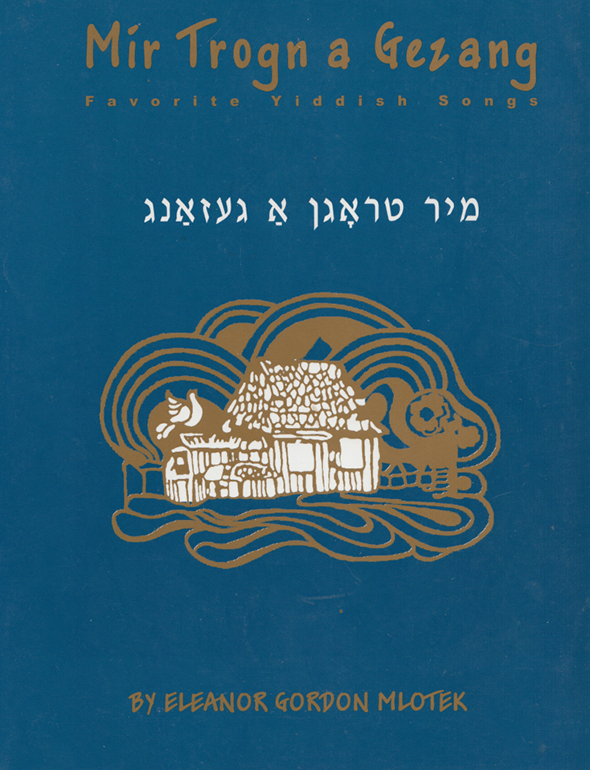Text by Chaim Zhitlowsky (1865-1943), translated from a poem by Georg Herwegh, a German poet (1817-1875), who took part in the attempted revolution in Baden in 1848. A refrain was added in the Yiddish adaptation.
In A. Idelsohn’s version the line reads, “Break the chains of Nicholas,” instead of “slavery.”

And you plow and you sow,
you fodder and you sew,
you hammer and you weave –
tell me, my people, what do you earn?
Chorus:
Cling-clang, cling-clang
The hammer rings out its song
Cling-clang, cling-clang
break the chains of forced slavery!
You weave day and night at your loom,
dig iron for us from the mine,
you bring us prosperity
full of grain and of wine.
But where is your table set?
Where are your holiday clothes?
Where is your sharpened sword?
What happiness are you fated for?
Wake up, working man
and recognize your great strength,
If you mighty arm wills it,
all the wheels will stop.
Un du akerst un du zeyst,
Un du fiterst un du neyst,
Un du hamerst un du shpinst —
Zog, mayn folk, vos du fardinst?
CHORUS:
Kling-klang, kling-klang!
Klapt der hamer mit zayn gezang!
Kling-klang, kling-klang!
Tserayst di keytn fun shklafn-tsvang!
Vebst dayn vebshtul tog un nakht,
Grobst undz ayzn fun der shakht,
Brengst di shefe undz arayn,
Ful mit tvue un mit vayn.
Nor vu iz dayn tish gegreyt?
Nor vu iz dayn yomtev-kleyd?
Nor vu iz dayn sharfe shverd?
Velkhes glik iz dir bashert?
Man fun arbet oyfgevakht,
Un derken dayn groyse makht,
Ven dayn shtarker orem vil,
Blaybn ale reder shtil.
און דו אַקערסט און דו זײסט,
און דו פֿיטערסט און דו נײסט,
און דו האַמערסט און דו שפּינסט —
זאָג, מײַן פֿאָלק, װאָס דו פֿאַרדינסט?
רעפֿרײן:
קלינג-קלאַנג, קלינג-קלאַנג!
קלאַפּט דער האַמער מיט זײַן געזאַנג;
קלינג-קלאַנג, קלינג-קלאַנג!
צערײַסט די קײטן פֿון שקלאַפֿנצװאַנג!
װעבסט דײַן װעבשטול טאָג און נאַכט,
גראָבסט אונדז אײַזן פֿון דער שאַכט,
ברענגסט די שפֿע אונדז אַרײַן
פֿול מיט תּבֿואה און מיט װײַן.
נאָר װוּ איז דײַן טיש געגרײט?
נאָר װוּ איז דײַן יום-טובֿ-קלײד?
נאָר װוּ איז דײַן שאַרפֿע שװערד?
װעלכעס גליק איז דיר באַשערט?
מאַן פֿון אַרבעט אױפֿגעװאַכט,
און דערקען דײַן גרױסע מאַכט;
װען דײַן שטאַרקער אָרעם װיל,
בלײַבן אַלע רעדער שטיל.
Song Title: Un Du Akerst

First published in 1972, Mir Trogn A Gezang: Favorite Yiddish Songs was reprinted six more times (in 1977, 1982, 1985, 1987, 1988, 2000) due to popular demand. The songs in this anthology represent a sampling of beloved folk and well-known Yiddish songs, many of which are scattered in various song collections; some appear in very rare and inaccessible collections; and some were never before published. Folk songs comprise about a third of this volume and were selected mainly on the basis of popularity and sometimes for their historic significance. Needless to say, they are only representative of the vast, rich treasure of Yiddish folk material. The selection was made not only on the basis of personal preference, but in the knowledge they are favorites of many who sing these songs. Most of the songs represent the repertoire that was sung at Yiddish summer camps, May 1st demonstrations and at social gatherings. Many songs were introduced to American Jewry by Jewish immigrants who came to the United States after World War II, for whom these songs had been favorites in Poland and other East European communities destroyed by the Nazis.